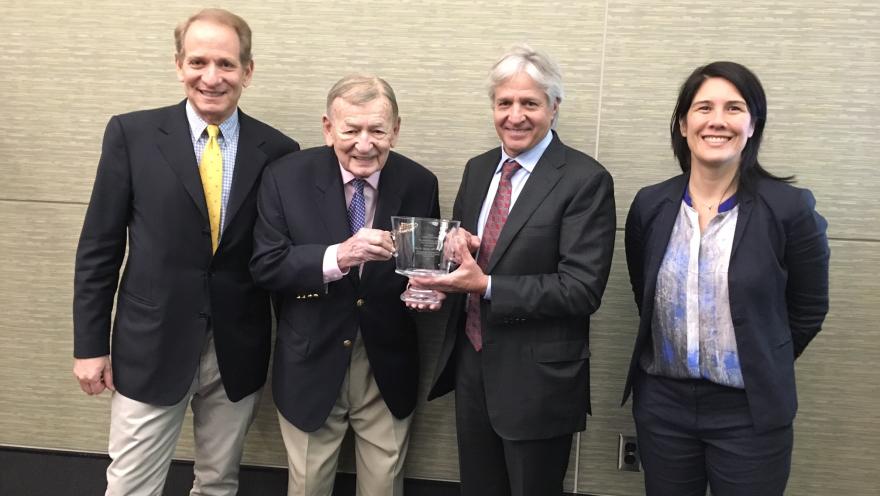Dr. John Ravits, Professor of Clinical Neurosciences and Head of the ALS Translational Research Program at the University of California, San Diego (UCSD) is a physician-scientist at the forefront of ALS thought and research of sporadic and familial ALS. Yesterday, at the 69th Annual American Academy of Neurology (AAN) Meeting in Boston, he was presented the prestigious 2017 Sheila Essey Award by Dick Essey, founder of the award named in honor of his wife Sheila who battled with ALS for ten years and died from the disease in 2004.
Over the course of his career, Dr. Ravits has emerged from the clinics where he cared for thousands of patients to formulate specific ideas about onset and progression of ALS and to take these ideas to create idealized models. His basic science research interests and contributions to science are far reaching from understanding the onset and progression of ALS in the body to exploring ALS neuropathology to functional genomics in motor neurons and more. Dr. Ravits also played an integral part in antisense oligonucleotide (ASO) therapy development for the most common genetic cause of ALS, the repeat expansion of the C9orf72 gene.
Today, we sit down with Dr. Ravits to learn more about his illustrious career in ALS and what he is up to now.
What is your academic background?
My clinical training was in neurology here at University of California, San Diego (UCSD) in the 1980’s, and then I did fellowships in clinical neurophysiology and neuromuscular diseases at the Brigham and Women’s Hospital and National Institute of Neurological Disorders and Stroke (NINDS). In 1986, I joined the Virginia Mason Medical Center, a referral center for Puget Sound, and the Benaroya Research Institute, both in Seattle. In 2011, I joined the Neurosciences Department at University of California, San Diego. I direct UCSD’s ALS Association Certified Center of Excellence and UCSD's ALS Translational Research Program.
How and why did you get involved in ALS research?
Through observations of many patients over more than 15 years, I had specific ideas about onset, progression and underlying mechanisms related to spread or propagation of disease. I wanted to pursue these ideas scientifically.
What are your current research interests?
My wet laboratory is profiling and exploring the transcriptome in ALS motor neurons, neuropathology and trying to understand propagation in ALS nervous systems. My translational research is trying to understand phenotypes (i.e. observable characteristics) and natural history of ALS, build and study biorepositories and pursue clinical trials, especially antisense oligonucleotide (ASOs) therapies.
Who are you currently working with?
My research group consists of 2 postdoctoral fellows, 2 international translational fellow, 3 graduate students, 1 lab technician and 3 clinical coordinators. My closest collaborators here at UCSD are Drs. Don Cleveland and Gene Yeo, both in the Department of Cellular and Molecular Medicine. We share several research projects, cellular and mouse models of ALS, neuropathology, ASO development projects, a rich conferencing schedule and graduate/postdoctoral fellows.
How will your Sheila Essey Award push your research forward?
The award provides crucial recognition that the ideas about propagation are important for discussion. It will help broaden the network of research collaborations. The financial award will seed new research projects.
What do you think is the most exciting research happening now in the ALS field?
Antisense oligonucleotide therapies! These bring an exquisite therapeutic strategies targeting very upstream molecular mechanisms involved with ALS and have a very real chance of fundamentally altering disease course.
Is there an experience in your ALS clinic that stands out to you that you would like to share?
Every clinic is an amazing experience for me that challenges me at every level. The challenges range from very scientific level such as molecular science, genetics and neuropathology to very human levels involving humane care, ethics and health care systems. I get to experience all this with amazing teams of talented and dedicated professionals.
Do you have a message for people living with ALS and their loved ones?
We all want only one thing--to cure ALS.!
About the Sheila Essey Award:
The Sheila Essey Award for ALS Research is given to acknowledge and honor an individual who is making significant contributions in research. The award is made possible through the generosity of the Essey Family Fund through The ALS Association Golden West Chapter, in memory of Sheila Essey, who battled ALS for ten years and died from the disease in 2004. Richard Essey, Sheila’s husband, served as a National Trustee of The ALS Association and is one of the founders of the Greater Bay Area Chapter, now the Golden West Chapter. Past recipients have used the funds to continue ALS research or to support promising young scientists on their research teams. The ALS Association and The AAN are deeply grateful for the unwavering commitment of Richard Essey in continuing to support this important honor.
Read the press release HERE.


Join the conversation. Please comment below.